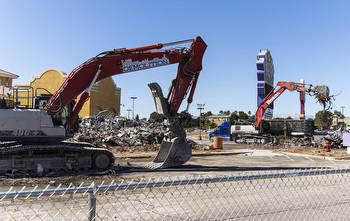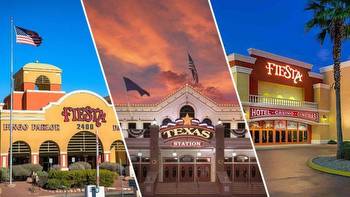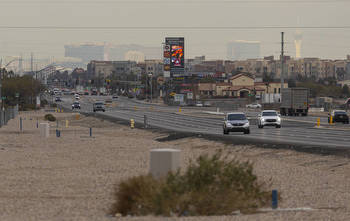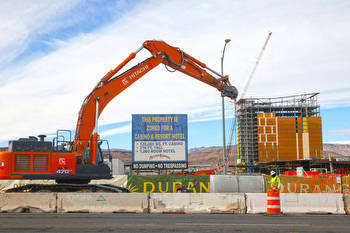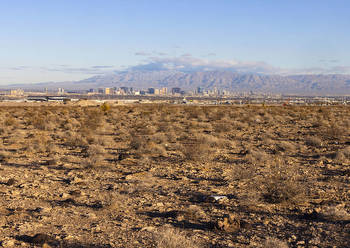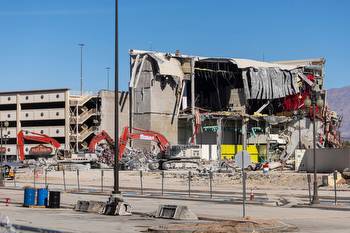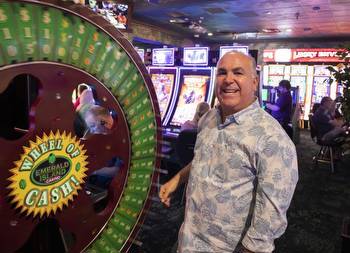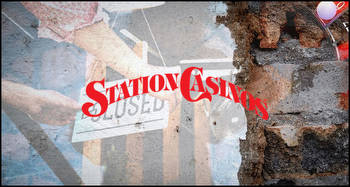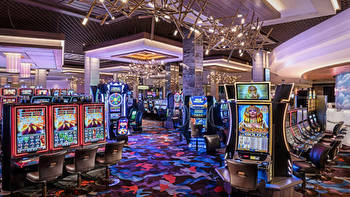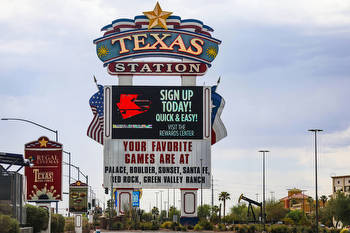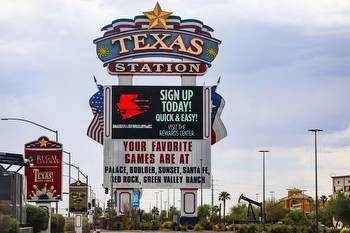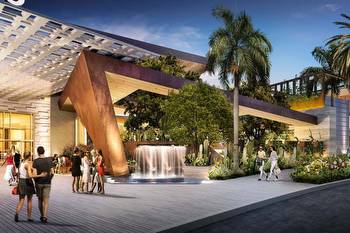Station Casinos to demolish hotels; high hopes for land use

When Red Rock Resorts’ Station Casinos Inc. demolishes its two hotel casinos at Lake Mead Boulevard and Rancho Drive in North Las Vegas, the mayor of the city hopes the land will be converted to commercial uses and not big-box stores.
North Las Vegas Mayor John Lee, in office until he is term-limited out at the end of the year, also remains hopeful that the land might become home to another casino, although that doesn’t appear to be in the cards, according to Station executives.
“Somebody who buys that (land) may think they’re going to put big-box stores in that area,” Lee said in response to Friday’s announcement that Station intends to permanently close Texas Station and Fiesta Rancho, demolish the buildings and sell the land.
“We’re not interested in that,” he said. “There’s a community over there that needs services. And so we’re going to look at what we can do to not impact that community with just a lot of traffic. We want to protect that community.”
Lee, who ran an unsuccessful campaign for the Republican nomination for governor against several opponents in June, said the North Las Vegas City Council wouldn’t be opposed to another casino opening at that corner.
“(Texas Station) had bowling alleys, movie theaters, they had a lot of stuff over there and it blended well,” Lee said. “If it’s another casino, that would be great. We’re not against that at all.”
But we’re not expecting big-box buildings to be built over there.
Just east of the Fiesta Rancho site are a Walmart Supercenter and medical offices. Fiesta Rancho and Texas Station occupy around 72 acres.
Lee is happy that Station intends to reinvest in North Las Vegas with an all-new casino project.
“They would like to put another casino in, I think, off Losee and the 215 (Beltway),” he said. “They say it will be as nice or nicer than the Aliante (the hotel-casino operated by Station rival Boyd Gaming Corp. about 3 miles west of that site),” he said. “Their building would be on the (north) side of the 215. They see the growth out there as being something very attractive to building a very nice world-class casino in that area.”
Lee also is happy Station intends to keep the Pepsi Ice Arena, adjacent to Fiesta Rancho, for as long as Station continues to own the land. But he’d like to see a Vegas Golden Knights-sponsored venue there for the long term.
“I’d rather see something that the Golden Knights would put up over there,” Lee said. “North Las Vegas is somewhat feeling that it’s being left out of sharing the success of our community. I don’t know if they feel obligated to involve North Las Vegas as they have Henderson.”
Lee said he has spoken with Kerry Bubolz, president and chief operating officer of the Golden Knights, whom he described as “a very good man, but he doesn’t make the final decisions.”
“We have alerted them to the fact that this community has a lot of use in it and a lot of Golden Knights fans,” Lee said. “We’d like our children to be able to get into hockey like the other communities.”
Meanwhile in Henderson, Mayor Debra March said she hoped the city could get a unique development at the Fiesta Henderson site.
“While we are sad to bid farewell to Fiesta Henderson, we are excited to welcome new development to Henderson that will bring economic benefits to the community,” March said in a statement. “The Fiesta Henderson site is a prime location and we look forward to working with the land purchaser to develop a project that will bring the greatest value and benefit to Henderson residents.”
Shifting locals landscape
Casino analysts had mostly positive comments about the Station move.
“After over two years of closure, you had to wonder at what point was Station going to reopen these shuttered properties,” said industry analyst Brendan Bussmann, founder of Las Vegas-based B Global.
“I guess the biggest surprise out of today is that not only are they selling them but they are also taking them down to the ground. It shows the continuing shift in the locals market since The Great Shutdown.”
Josh Swissman, a founding partner of the Las Vegas-based Strategy Organization, said he thought the choice to demolish the buildings was a competitive one.
“They obviously don’t want other casino operators to be near them or to represent that same land, so for them to tear those properties down and sell it — likely with restrictions that whoever is the buyer doesn’t build a casino — makes total sense to me, too,” Swissmann said. “It’s a great defensive move.”
Bussmann said the company still has some opportunity to continue to shift that market to other parts of the valley as it owns several other parcels of land as seen with the long-awaited development of Durango Casino & Resort in southwest Las Vegas.
“The biggest void off of this in terms of landscape stems from the departure to North Las Vegas near the center of the valley,” he said. “Those gaming and non-gaming dollars have likely gone to other locations at this point but this leaves a big void for entertainment in this part of Las Vegas.”
But Swissman expects those would-be Texas Station and Fiesta Rancho customers in the northwest will migrate to Santa Fe Station just as easily, or to a planned North Las Vegas project.
“They’re smart guys with great operators and also great real estate speculators,” Swissman said. “Just look around town at all the real estate that they own and it’s pretty obvious that they’re smart about buying real estate, so they must see something there in terms of future opportunity.”
Red Rock Resorts shares, traded on the Nasdaq exchange, were up $1.29, 3.9 percent to close Friday at $34.13 a share in volume nearly twice the daily average.
Fiesta Rancho
Fiesta Rancho originally known just as the Fiesta — opened its doors Dec. 14, 1994, on 25.5 acres and built for $25 million by the Maloof family.
The first major casino property to be built in North Las Vegas, it included 100 hotel rooms in a five-story tower and a 25,000-square-foot casino.
It became popular with locals for its signature Garduño’s Mexican restaurant, which the Maloofs brought in from New Mexico.
The property expanded by 50,000 square feet in 1995 with a buffet and a larger casino area. The property expanded again in 1999 by 70,000 square feet, with 20,000 of that dedicated to the casino.
Fiesta built a following as “the Royal Flush Capital of the World,” with 1,000 of the casino’s 1,400 slot machines offering video poker. At one point, the company vowed that it had paid out 118,500 royal flushes.
In July 2000, Station Casinos announced that it was buying the Fiesta, and the Maloof family used the proceeds to build what eventually would be known as the Palms.
Under Station, the Fiesta added the ice arena after closing a similar amenity at Santa Fe Station. The property has nearly 60,000 square feet of casino space.
Texas Station
Texas Station opened July 12, 1995, across Lake Mead Boulevard from the Fiesta at a cost of $62.8 million. Located on 47 acres, the property embraced all things Texas and hosted an appearance by the Dallas Cowboy cheerleaders at the grand opening.
With a casino covering nearly 122,000 square feet and a 200-room hotel, Texas Station dwarfed its neighbor across the street.
Texas expanded in 1996, 1999, 2000 and 2018. Among its added amenities over the years were wedding chapels, meetings and convention space, two parking garages, one each for employees and guests, a 60-lane bowling center, a food court and an 18-screen movie theater complex as well as additional casino space.
After Texas and other Nevada casinos closed in March 2020, one of the Texas Station parking garages became a site for COVID-19 testing.
Fiesta Henderson
Fiesta Henderson, formerly known as The Reserve, opened Feb. 10, 1998. Located on 35 acres, Fiesta Henderson has more than 73,000 square feet of casino space and 224 hotel rooms.
Gem Gaming, which eventually merged with Las Vegas-based Ameristar Casinos, was the original developer. Ameristar eventually was absorbed by Pinnacle Entertainment and then by Penn National Gaming.
Ameristar sold The Reserve for $71.8 million to Station, which took ownership in January 2001, rebranding the property as Fiesta Henderson.
During its closure, Fiesta Henderson was occasionally used as a COVID-19 testing site.
McKenna Ross is a corps member with Report for America, a national service program that places journalists into local newsrooms. Contact her at mross@reviewjournal.com.@mckenna_ross_ on Twitter. Contact Richard N. Velotta at rvelotta@reviewjournal.com or 702-477-3893. Follow @RickVelotta on Twitter.








